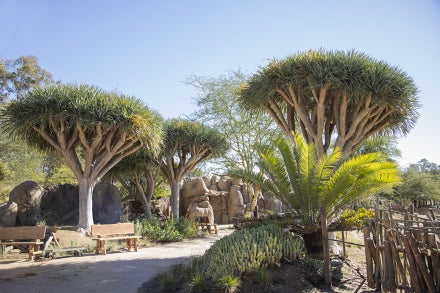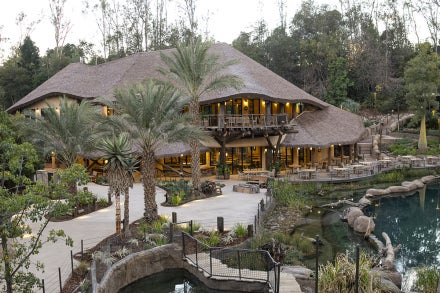FOR IMMEDIATE RELEASE
CONTACT:
San Diego Zoo Wildlife Alliance
Public Relations
publicrelations@sdzwa.org
619-685-3291
sdzwa.org
NEWS RELEASE
San Diego Zoo Wildlife Alliance Reintroduces Endangered Mice at Marine Corps Base Camp Pendleton
The Collaborative Effort Contributes to Conservation Initiatives in Response to Coastal Habitat Loss
SAN DIEGO (May 30, 2024) – San Diego Zoo Wildlife Alliance reintroduced a group of endangered Pacific pocket mice to a release site outside of active training areas on Marine Corps Installations West, Marine Corps Base (MCB) Camp Pendleton. In partnership with the U.S. Fish and Wildlife Service and the California Department of Fish and Wildlife, this initiative is part of an ongoing effort to bring the species back from the brink of extinction.
“It is really exciting to see the initiation of a new population of Pacific pocket mice on MCB Camp Pendleton,” said Debra Shier, Ph.D., Brown Endowed Associate Director of Recovery Ecology at San Diego Zoo Wildlife Alliance. “This is the second reintroduced population, which brings us a step toward recovery of the species. The success of this program depends on partnerships with the U.S. Fish and Wildlife Service, the California Department of Fish and Wildlife, and the Marine Corps, and exemplifies our commitment to restoring local endangered species and the ecosystems on which these species depend.”
The Pacific pocket mouse, native to coastal scrublands, dunes and riverbanks within a 2.5-mile radius of the ocean, once inhabited an extensive range from Los Angeles to the Tijuana River Valley. However, due to human encroachment and habitat degradation since 1932, the Pacific pocket mouse population sharply declined. Thought to be extinct for two decades, a small group was rediscovered in 1993 at Dana Point headlands in Orange County. By then, the species had dwindled to a few isolated populations separated by urban barriers and long distances. The U.S. Fish and Wildlife Service emergency listed the mouse as endangered under the Endangered Species Act in 1994.
“Marine Corps Base Camp Pendleton recognizes the importance of maintaining a healthy and diverse ecosystem while also prioritizing military training and mission readiness,” said James Uwins, conservation division head of environmental security at Marine Corps Installations West-MCB Camp Pendleton. “Through continuous conservation efforts and steadfast partnerships with local organizations like the San Diego Zoo and the U.S. Fish and Wildlife Service, we continue to preserve natural habitats of many species, including the Pacific pocket mouse, for future generations to come.”
To prevent extinction, San Diego Zoo Wildlife Alliance initiated a conservation breeding and reintroduction program in 2012 in partnership with the California Department of Wildlife Services, which has supported the program through 2024 to fulfill its mission of managing California’s diverse natural resources. This program aims to breed genetically diverse and behaviorally competent mice suitable for reintroduction into their native habitats. With support from Orange County Parks, a new population was initiated in Laguna Coast Wilderness Park in 2016, and they began breeding independently in 2017.
“To be successful at recovering species in Southern California, we need projects such as the reintroduction of the Pacific pocket mouse,” said Scott Sobiech, field supervisor for the U.S. Fish and Wildlife Service's Carlsbad Fish and Wildlife Office. “This project also exemplifies the incredible partnerships we have developed with the Department of Defense, San Diego Zoo Wildlife Alliance, U.S. Geological Survey, Orange County Parks, and many others that are integral to achieving our conservation mission.”
Despite their tiny size (weighing only as much as three pennies), Pacific pocket mice play a vital ecological role by dispersing native plant seeds and promoting plant growth through their digging activities. The breeding program not only safeguards the species, but also enhances understanding of managing genetic diversity in native populations. Given that only three small populations of Pacific pocket mice remain, collaborative efforts by San Diego Zoo Wildlife Alliance, alongside research and habitat management, are crucial for conservation.
“The recovery efforts of the endangered Pacific pocket mouse reflect the hard work and dedication from organizations, both government and nonprofit, to find common ground on a diverse and sometimes complicated landscape to improve wild populations and establish new ones,” said Hans Sin, senior environmental scientist at the California Department of Fish and Wildlife. “This effort with the San Diego Zoo Wildlife Alliance shows an excellent example of how partnerships can achieve a common goal to recover a species.”
MCB Camp Pendleton, within the MCI-West region, actively manages 26 federally listed threatened and endangered species alongside its training activities. Through environmentally conscious training practices, the Marine Corps has preserved and protected vast areas of land and numerous species, including the Pacific pocket mouse, making MCB Camp Pendleton both a training ground and a sanctuary.
###
About San Diego Zoo Wildlife Alliance
San Diego Zoo Wildlife Alliance, a nonprofit conservation leader, inspires passion for nature and collaboration for a healthier world. The Alliance supports innovative conservation science through global partnerships. Through wildlife care, science expertise and collaboration, more than 44 endangered species have been reintroduced to native habitats. Annually, the Alliance reaches over 1 billion people, in person at the San Diego Zoo and San Diego Zoo Safari Park, and virtually in 150 countries through media channels, including San Diego Zoo Wildlife Explorers television programming in children’s hospitals in 14 countries. Wildlife Allies—members, donors and guests—make success possible.
About San Diego Zoo Wildlife Alliance
San Diego Zoo Wildlife Alliance is a nonprofit international conservation leader, committed to inspiring a passion for nature and working toward a world where all life thrives. The Alliance empowers people from around the globe to support their mission to conserve wildlife through innovation and partnerships. San Diego Zoo Wildlife Alliance supports cutting-edge conservation and brings the stories of their work back to the San Diego Zoo and San Diego Zoo Safari Park—giving millions of guests, in person and virtually, the opportunity to experience conservation in action. The work of San Diego Zoo Wildlife Alliance extends from San Diego to eco-regional conservation “hubs” across the globe, where their expertise and assets—including the renowned Wildlife Biodiversity Bank—are able to effectively align with hundreds of regional partners to improve outcomes for wildlife in more coordinated efforts. By leveraging these skills in wildlife care and conservation science, and through collaboration with hundreds of partners, San Diego Zoo Wildlife Alliance has reintroduced more than 44 endangered species to native habitats. Each year, San Diego Zoo Wildlife Alliance’s work reaches over 1 billion people in 150 countries via news media, social media, their websites, educational resources and the San Diego Zoo Wildlife Explorers television programming, which is in children’s hospitals in 13 countries. Success is made possible by the support of members, donors and guests to the San Diego Zoo and San Diego Zoo Safari Park, who are Wildlife Allies committed to ensuring all life thrives.



